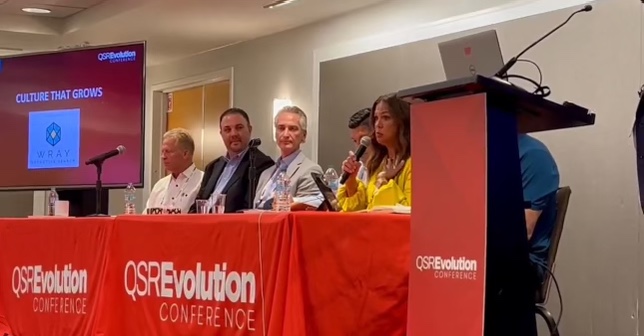Attending the QSR Evolution Conference was a whirlwind of insights and inspiration. It was incredible to hear from some of the most forward-thinking leaders in the quick-service restaurant (QSR) industry, and I came away with a lot of new ideas and strategies to bring back to my clients.
RBI Roundtable: A Masterclass in Leadership
One of the sessions that really resonated with me was the RBI Roundtable featuring Jeff Klein, President of Popeyes, Katerina Glyptis, President of Tim Hortons U.S., Tom Curtis, President of Burger King, and Michael Hancock, President of Firehouse Subs.
Each leader offered such unique perspectives, but what stood out to me was how they all emphasized the importance of building strong foundations. Jeff Klein spoke about how Popeyes is focusing on being “easy to love” by simplifying guest access, optimizing back-of-house operations, and ensuring their menu is irresistible. I loved how practical this approach is—if the operational foundation is strong, everything else falls into place.
Katerina Glyptis, who leads Tim Hortons in the U.S., shared how they dominate their local markets by focusing on customer loyalty and building a brand people trust. Her humility and passion were evident, and it reminded me of how vital it is to have leaders who genuinely care about their teams and customers.
Tom Curtis from Burger King echoed a similar sentiment when he spoke about rebuilding their brand, using the analogy of “reclaiming the flame.” His focus on getting the basics right before expanding was a critical takeaway for me. And then, there was Michael Hancock, who leads Firehouse Subs with a leadership style that includes using emojis and Spanglish with his team! His focus on empowering local franchisees and supporting first responders with franchise opportunities was both inspiring and heartwarming.
AI and the Future of QSR Operations
Another highlight for me was the “Cracking the Code on AI” panel, where we explored how AI is transforming the QSR industry. Aaron Nilsson from Jet’s Pizza talked about how they are using AI to handle 20% of their orders via text and how it assists with phone calls, freeing up staff to focus on in-person service. This is such a smart way to leverage technology without losing that personal touch.
Meanwhile, Jon Asher from Nekter Juice Bar shared how they use AI to improve customer communication by generating faster, more personalized responses. I could immediately see how something like this would benefit my clients by speeding up service and improving guest satisfaction.
J.F. Grossen added that AI is helping streamline marketing efforts, allowing brands to create consistent messaging across all platforms. For me, this reinforced the idea that AI is not just about efficiency—it’s also about enhancing the customer experience.
Chipotle’s People-First Culture
My favorite speaker of the day was Haris Khan from Chipotle, who discussed the company’s commitment to being an employer of choice. He emphasized the importance of a strong culture and how Chipotle invests in its employees’ physical and mental well-being. What I found particularly impressive was that all of Chipotle’s leadership team started as crew members, which shows their dedication to developing talent from within.
Their industry-leading programs focus on training, role-playing, and providing opportunities for continuous learning. Haris explained how they conduct roundtable meetings where team members can have open conversations, ensuring everyone feels heard and valued. I think this focus on attracting, developing, and retaining talent is something all restaurant operators can learn from.
Tech Integration and the Power of a Strong Tech Stack
In the “Secrets of the Tech Stack” session led by Wade Allen, David Macchi, Alessandro Biggi, and Meredith Sandland, we explored how AI and integrated technology can revolutionize restaurant operations, from food safety to customer experience. The emphasis on data security and having a unified system that connects the front-of-house with the back-of-house was a crucial takeaway for me. It’s clear that investing in a strong tech stack is non-negotiable in today’s competitive landscape.
Reflecting on Partnerships and Leadership
I also had the privilege of joining Satyne Doner on the Women in Restaurant Leadership podcast, where we discussed leadership and the evolving role of women in the industry. It was such a meaningful conversation, and I want to give a big thank you to Satyne and Danny Klein for organizing such an impactful event.
On a personal note, I was thrilled to reconnect with my partners at Momo’s, where we brainstormed how we’ll be integrating their AI-driven systems into EyeSpy’s offerings early next year. Momo’s was mentioned several times during the conference for its ability to streamline customer service and operational metrics, and I’m excited to see how our partnership will grow.
Bravo to DoorDash for sponsoring such an awesome after-party at Kitchen & Cocktails. It was fun to celebrate under the DoorDash logo with so many industry peers!
It was great to catch up with Satyne Doner who featured me on the Wirl podcast this summer! Special shoutout to her, Danny Klein, and the entire WTWH media team for putting together such an amazing event! I’m looking forward to more next year!
Looking Ahead
The QSR Evolution Conference was a reminder of just how fast our industry is changing. From AI integration to the focus on leadership and culture, I walked away with so many actionable insights that I’m eager to implement with my clients. It’s clear that the future of quick-service restaurants lies in embracing innovation while never losing sight of what makes each brand unique.
Stay tuned for EyeSpy’s upcoming projects—we have exciting things in the works!







